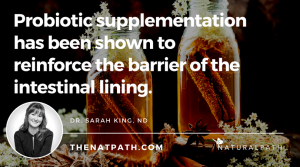Would it surprise you to know that the human colon contains about 3.3 lbs. of bacteria?1
 This microbiota is practically its own organ, acting as an entire ecosystem, with its own immune system, nervous system, and the ability to influence what the body absorbs from inside the intestinal lumen.
This microbiota is practically its own organ, acting as an entire ecosystem, with its own immune system, nervous system, and the ability to influence what the body absorbs from inside the intestinal lumen.
Consider the gut as the bridge between the inside of the body and the outside, connected by signals, nerves, compounds and other molecules. The gastrointestinal tract (GIT) is like a tube running from one end of your body to the other, acting as a barrier between what you ingest and what actually gets absorbed. Its job is to absorb nutrients and protect you from pathogens. However, at the same time, you have trillions of bacteria in there, working along this lining, and determining influential aspects of your health.
The gut lining must stay tightly controlled to stop anything that you eat from just wandering into your blood stream. These cells are susceptible to changes and inflammation all related to what you’re eating (what the cells are exposed to) and the strains of bacteria species present.
 Probiotic supplementation has been shown to reinforce the barrier of the intestinal lining.2 This barrier not only decreases infections, but also prevents reactions to food antigens, causing what we call “food sensitivities” or IgG immune reactions. These reactions have been responsible for a multitude of symptoms such as gas, bloating, diarrhea, and eczema.
Probiotic supplementation has been shown to reinforce the barrier of the intestinal lining.2 This barrier not only decreases infections, but also prevents reactions to food antigens, causing what we call “food sensitivities” or IgG immune reactions. These reactions have been responsible for a multitude of symptoms such as gas, bloating, diarrhea, and eczema.
The composition of the gut microflora isn’t just based on probiotics supplementation though. A poor diet can lead to a change in the species composition that colonizes the gut. The gut microbiota not only help to digest your leftovers from higher up in the intestines, but they actually produce their own cocktail of nutrients, neurotransmitter signals and other chemicals that determine your health.
The Role of the Gut Microbiota in Host Health
The term “gut microbiota” is used to describe the multitude of species and colonies of bacteria and yeast in the GIT. The composition of the gut microbiota is influenced by diet, stress and environmental factors3, however, diet may play the largest role, attributing to 60% of the gut microflora.1
The diversity and density of gut microbiota is influenced by our diet as bacteria feed on the undigested foods in the large intestine1; this includes resistant starches, non-starch polysaccharides such as celluloses, pectins and gums, as well as non-digestible oligosaccharides often called “prebiotics.”4
This feeding drives the fermentation of carbohydrates in the colon and releases short chain fatty acids for energy production for other, more specialized bacteria.5 The metabolites produced by gut microbiota play crucial roles in host health. These metabolic products include: regulators of cytokines, inflammation, and the immune system; visceral pain modulators via induction of opioid and cannabinoid receptors; and key nutrients such as folic acid, and neurotransmitters such as GABA1 and serotonin6.
Lactic acid bacteria are known to release various enzymes and vitamins, and have also been shown to affect the pH of the intestinal environment to inhibit the development of invasive pathogens such as Salmonella and E. coli strains.2
Any disturbance in this ecosystem by diet, pathogens, or antibiotics can lead to gut dysbiosis, and therefore, impair activity of gut bacteria. This may result in negative effects on host health due to changes in intestinal wall integrity and transit time of food through the GIT.1,7 Additionally, gut dysbiosis has been associated with anxiety and depression, and animal studies have shown that probiotic supplementation may be a potential treatment for these mental health conditions.8
The Gut-Brain Connection
The gut-brain axis essentially is the connection between the enteric nervous system and the central nervous system, including all communications between the GIT and the brain. Gut bacteria play a critical role in the function of this axis6as well as the hypothalamic-pituitary-adrenal axis and thus, stress hormone release.8
Serotonin, a neurotransmitter, functions as a major signaling molecule in the enteric nervous system, functioning and overlapping with the central nervous system.6 Tryptophan, a precursor to serotonin, is found in seeds, soybeans, meat and fish. Tryptophan is absorbed in the gut and crosses the blood-brain barrier where it is transformed into serotonin.6 Interestingly, the majority of serotonin in our bodies is actually located in the gut, synthesized by enterochromaffin (EC) cells.6 This production of serotonin is used to modulate the functioning of the GIT via secretion, peristalsis, vasodilation, and the perception of pain and nausea.6
Not only do EC cells synthesize serotonin, but gut bacteria have the ability to produce serotonin from tryptophan and use it as a signal within the gut-brain axis to modify host behavior.6 Serotonin also helps to regulate the development of microvilli: microscopic protrusions that increase the surface area of the intestinal lining to promote increased absorption of nutrients.9
Development and Maintenance of a Healthy Gut Microbiota
As mentioned above, diet plays a key role in the maintenance of beneficial gut microbiota. After all, these bacteria are feeding on the compounds and nutrients that are found in our GIT. Fiber plays an especially important role and its absence can lead to bacterial migration. If their preferred food source isn’t available, bacteria will look to feed on other compounds, such as amino acids, releasing potentially harmful substances during metabolism.5 These substances may contribute to inflammation and “leaky gut” issues whereby intestinal permeability is altered and the tight junctions between intestinal cells lose their integrity. This process may influence the development of IBD or colon cancer, in addition to food sensitivities and/or allergies.5
Fermentation of dairy products such as yogurt and kefir with lactic acid bacteria have multiple benefits on human health. Fermentation increases levels of Vitamins B2 and B3 in yogurt.2 One study of a yogurt produced with the species Lactobacillus bulgaricus showed that daily consumption significantly reduced the incidence of the common cold in elderly subjects.10 These fermented dairy products may also help alleviate symptoms of lactose maldigestion.10
Current evidence is building that fermented foods may even help to promote cognitive health, enhance memory, and prevent neurotoxicity.8 Probiotic-rich diets have led to positive effects on stress relief, as gut bacteria are closely associated with hormonal stress responses.8
Probiotics and Prebiotics
Probiotics by definition are live micro-organisms that are administered in high enough doses to provide beneficial health outcomes to the host.11 Probiotics can attenuate hormonal stress responses in addition to producing anxiolytic effects via GABA, glutamate, and serotonin production.8,11 Abnormal stress responses have been observed in adults with gut dysbiosis which can be reversed with proper colonization and restoration of the gut microbiota.7 Multi-strain probiotics have been shown to decrease cortisol and/or adrenocorticotropic hormone (ACTH).
Human studies are on-going, some of which are investigating the involvement of gut microbiota in areas such as autism, Parkinson’s and chronic pain.7 Strains most notable for their ability to improve anxiety, depression, and stress responses, in addition to gastrointestinal relief include B. longum, B. breve, B. infantis, L. helveticus, L. rhamnosus, L. plantarum, and L. casei, with doses ranging from 10 million to 40 billion colony-forming units (CFU) per day.11
Prebiotics are typically non-digestible fibers that have been shown to stimulate the growth and/or activity of beneficial microflora in the colon.4 Often there is a preference by Bifidobacteria to consume oligosaccharides4 which can be found as a supplement or as part of a probiotic blend. Prebiotics also occur naturally in foods such as leeks, asparagus, chicory, Jerusalem artichokes, garlic, onions, and oats.4
Conclusions
The colonization of the GIT by bacterial species influences several areas of our overall health including digestion, mood and behaviour. The ability of the gut microflora to modulate cytokines, and produce nutrients and neurotransmitters play key roles in signaling between the gut and other body systems such as the HPA axis, the immune system and the central nervous system. Their presence also protects us from infections by strengthening the barrier of intestinal cells separating the outside of the body (including what we ingest) from the inside of the body (within the bloodstream or body tissues).
Fermented foods such as yogurt and kefir, in addition to prebiotic food ingredients such as chicory and inulin may serve as a vector for beneficial bacteria exposure. However, with equal importance is the maintenance of a high fiber diet via vegetables, and grains such as oats, which feed these bacteria, allowing for the metabolic products which are so beneficial to our health.
References
- van Kylckama Klieg, J.E., Veiga, P., Zhang, C., Derrien, M., and Zhao, L. “Impact of microbial transformation of food on health – from fermented foods to fermentation in the gastro-intestinal tract” (2011) Curr Opin Biotechnol. 22(2): 211-9
- Parvez, S., Malik, K.A., Ah Kang, S., and Kim, H.Y. “Probiotics and their fermented food products are beneficial for health” (2006) J Appl Microbiol.100(6): 1171-85
- Lin, C.S., Chang, C.J., Lu, C.C., Martel, J, et al.“Impact of the gut microbiota, probiotics, and probiotics on human health and disease” (2014) Biomed J. 37(5): 259-68
- Savin, J. “Fiber and prebiotics: mechanisms and health benefits” (2013) Nutrients. 5(4): 1417-35
- Marchesi, J.R., Adams, D.H., Fava, F., Hermes, G.D., et al.“The gut microbiota and host health: a new clinical frontier” Gut(2016) 65(2): 330-9
- O’Mahony, S.M., Clarke, G., Borre, Y.E., Dinan, T.G., and Cryan, J.F. “Serotonin, tryptophan metabolism and the brain-gut-microbiome axis” (2015) Beh Brain Res. 277: 32-48
- Mayer, E.A., Tillisch, K., and Gupta, A. “Gut/brain axis and the microbiota” (2015) J Clin Invest. 125(3): 926-938
- Kim, B., Hong, V.M., Yang, J., Hyun, H., et al. “A review of fermented foods with beneficial effects on brain and cognitive function” (2016) Prev Nutr Food Sci. 21(4): 297-309
- Nakamura, K., Sato, T., Shashi, A., Tsurui, H., and Hasagawa, H. “Role of a serotonin precursor in development of gut microvilli” (2008) Am J Pathol. 172(2): 333-44
- Morelli, L. “Yogurt, living cultures, and gut health” (2014) Am J Clin Nut. 99(5 Suppl): 1248S-50S
- Wang, H., Lee, I.S., Braun, C., and Enck, P. “Effect of probiotics on central nervous system functions in animals and humans – a systematic review” (2016) J Neurogastroenterol Motil. Jul 13 doi: 10.5056/jnm16018 [Epub ahead of print]
Image Copyright: <a href=’https://www.123rf.com/profile_luckyraccoon’>luckyraccoon / 123RF Stock Photo</a>
 Dr. Sarah King is a licensed Naturopathic Doctor, graduating from the Canadian College of Naturopathic Medicine in 2014. Prior to completing her medical studies, she attended Nipissing University where she received her Honors Bachelor of Science in Biology. Sarah has a passion for women’s health and is a birth doula in Durham and Toronto Region. She treats a wide variety of health conditions including menstrual disorders and hormone balancing, fertility, prenatal care, digestive concerns, skincare and mental health/anxiety. Outside the office Sarah is an avid runner with a love of the GTA’s best forest trails. She also continues to improve her yoga practice and teaches breath work as part of stress management counselling to her patients.
Dr. Sarah King is a licensed Naturopathic Doctor, graduating from the Canadian College of Naturopathic Medicine in 2014. Prior to completing her medical studies, she attended Nipissing University where she received her Honors Bachelor of Science in Biology. Sarah has a passion for women’s health and is a birth doula in Durham and Toronto Region. She treats a wide variety of health conditions including menstrual disorders and hormone balancing, fertility, prenatal care, digestive concerns, skincare and mental health/anxiety. Outside the office Sarah is an avid runner with a love of the GTA’s best forest trails. She also continues to improve her yoga practice and teaches breath work as part of stress management counselling to her patients.
Website: sarahkingnd.com
Facebook: facebook.com/sarahkingnd
Twitter: @sarahhealthyfox
Blog: http://adventuresofhealthyfox.blogspot.ca/

















